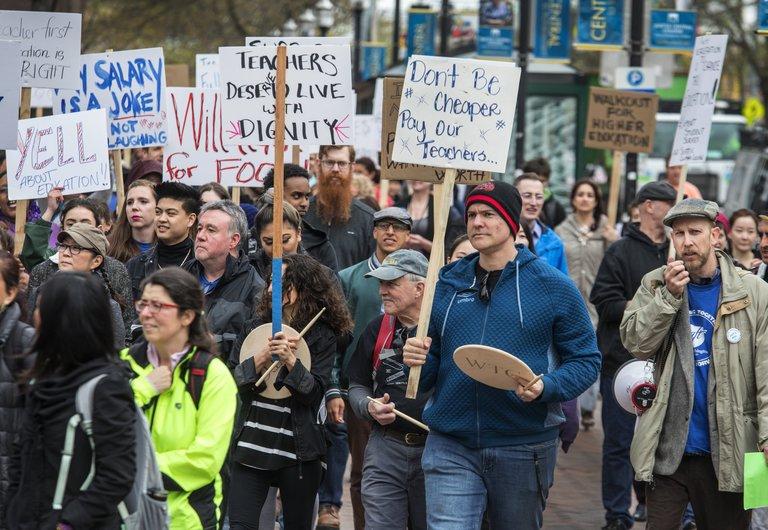
Cast by one instructor as the “forgotten children of higher education,” community colleges are often lauded for being affordable and accessible alternatives or gateways to four-year institutions. However, as a recent Seattle Times article explains, the last time that community college faculty in Washington received a raise commensurable to the cost of living was in 2008, and community college faculty statewide are paid about 12% less than faculty in peer states.
As I move through my final quarter as a Mellow Fellow and share my experiences with colleagues who are interested in applying for next year’s cohort, I want to take some time to reflect on some of the challenges I see facing both PhD students and community colleges. I believe we need to speak candidly about the harsh realities of the academic job market that affect community college positions as much as jobs at research institutions, while simultaneously drawing attention to the failure of academic departments and advisors to prepare or encourage their students to feel confident pursuing careers and opportunities beyond the research track.
On April 16, 2019, students, staff, and faculty from South, North, and Central Seattle colleges walked out to draw attention to the lack of funding and resources available to community colleges throughout the state of Washington. Cast by one instructor as the “forgotten children of higher education,” community colleges are often lauded for being affordable and accessible alternatives or gateways to four-year institutions. However, as a recent Seattle Times article explains, the last time that community college faculty in Washington received a raise commensurable to the cost of living was in 2008, and community college faculty statewide are paid about 12% less than faculty in peer states. As the American Association of University Professors (AAUP) observed in their 2018 data snapshot, nearly 70% of faculty at two-year institutions are part time instructors, while at R1 institutions—like the University of Washington—the percentage of part-time instructors is below 20%. Moreover, recent survey results suggest many local community college faculty—both full and part-time—rely on a second income and/or have considered leaving their current institution in search of increased stability or salary.
In short, community colleges are not exempt from the budget shortfalls and casualization of academic labor that plague research institutions, thus they will not be the saving grace of newly minted PhD’s unable to secure a tenure track position at a university. Instead, they are institutions struggling with limited resources to do their best for staff, students, and faculty—many of whom are adjunct instructors. As a testament to this, during a recent conversation I had with a colleague about the academic job market, they shared how the difficulty of piecing together full-time employment at local community colleges forced their partner out of teaching and onto a different career path altogether. During my time as a Mellon Fellow, I have observed first-hand how institutional struggles related to lack of money and resources contribute to job insecurity among part-time community college faculty, who—in some instances—find themselves without classes they had expected to teach shortly before the beginning of the term.
This kind of job instability is what PhD students like me seek to avoid. However, when talking about the bleak academic job market, community colleges are often excluded from these important conversations, or they are posed as fail-safe academic career paths. This raises some uncomfortable questions. Are graduate students only using their PhD training if they find a position teaching? And because tenure track and full-time positions are few and far between—especially in the humanities—is it smart to encourage graduate students to pursue teaching positions even if these will never lead to a tenured or full-time job? Moreover, what kind of pressure does this place on two-year institutions, especially in the state of Washington, which are constantly struggling to balance the needs of existing faculty, staff, and students?
The way I see it, two things need to happen here. First, the state needs to appreciate the important role that community colleges play and provide these institutions with the necessary funding for more full-time and tenured faculty positions in order to strengthen these institutions. Second, academic departments, advisors, and faculty need to rethink what constitutes success for their students and their programs, while being more forthcoming about the grim realities of the academic job market across the board. Doing so would recognize the importance of community colleges, increase long-term, viable teaching opportunities for PhD students, and open up career options for those seeking to use their experience and knowledge outside of the academy in meaningful ways.
Jennifer Smith (she/her/hers)
Jennifer Smith was a 2018 Mellon Collaborative Fellow for Reaching New Publics. Her research examines economic development and diversification within the Muckleshoot Nation from the 1960s through the early 2000s. Her work focuses on exploring the ways in which economic diversification and the expansion of economic development initiatives beyond reservation borders contribute to Muckleshoot nation-building efforts.
